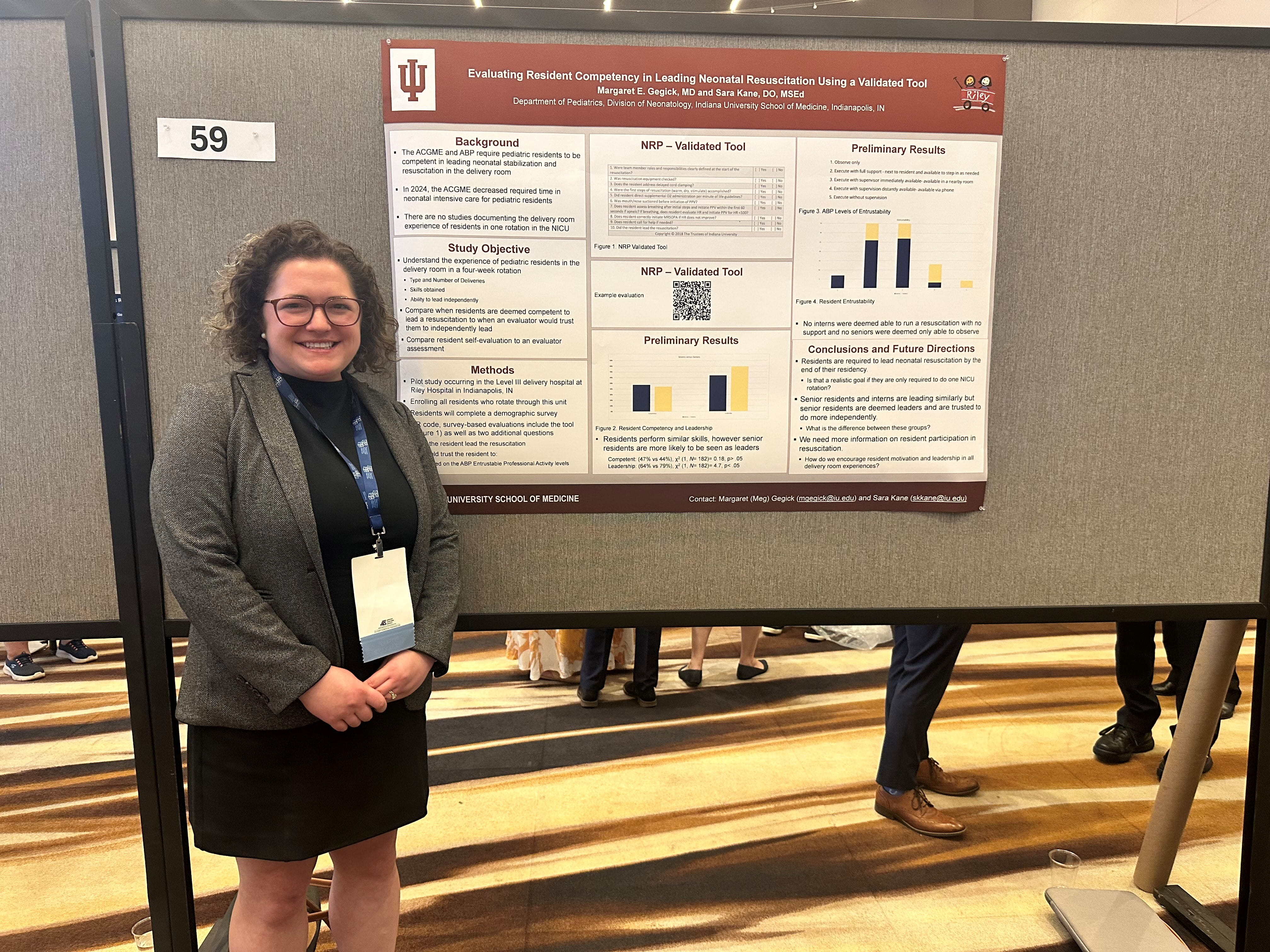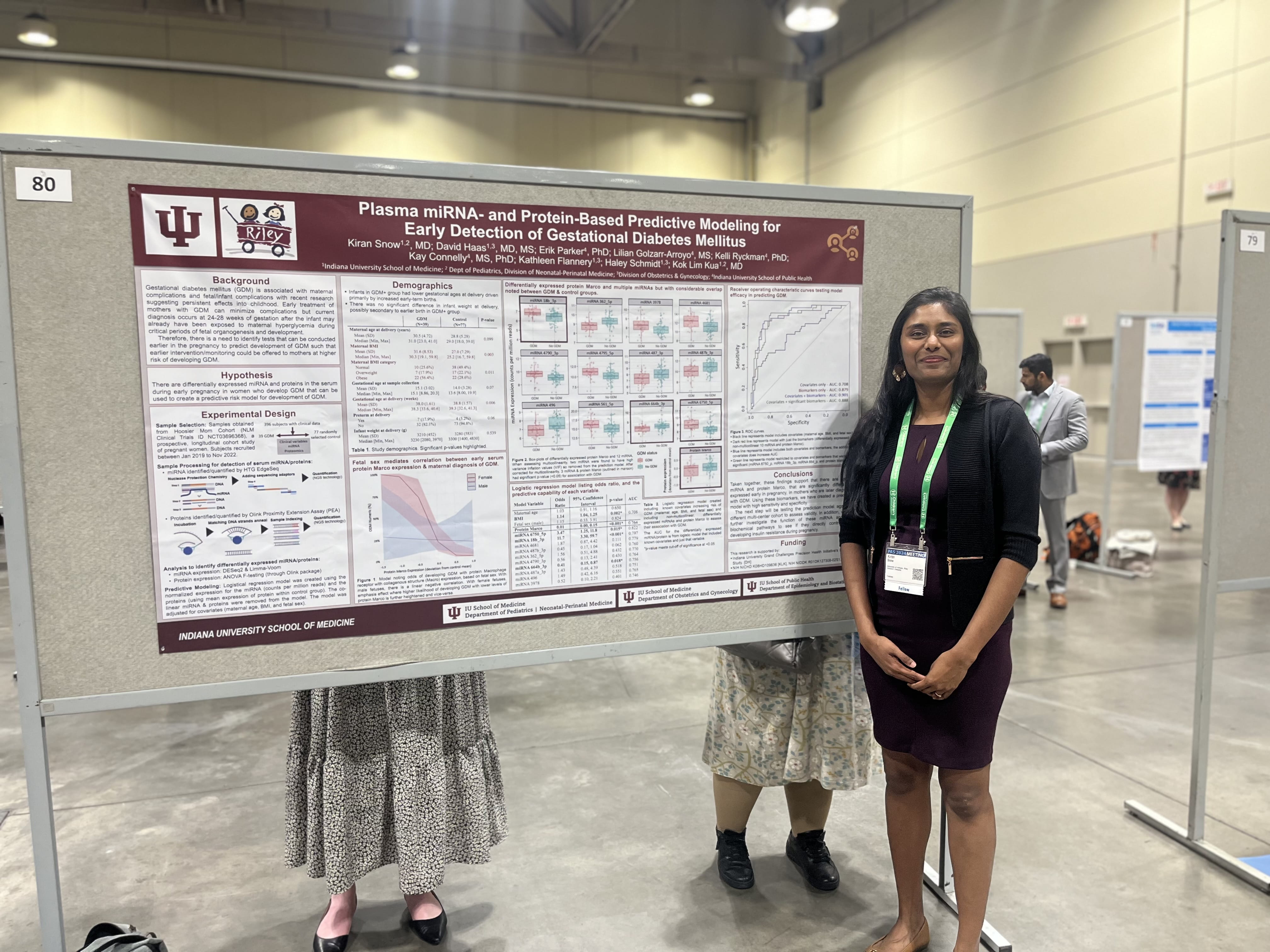

Research opportunities are available to fellows in both basic and clinical research throughout Indiana University School of Medicine and the Department of Pediatrics. The Department of Pediatrics consistently ranks in the top 10 in NIH funding nationally. Explore the full range of research programs in the Department of Pediatrics.
The following are examples of areas of research neonatal fellows have investigated and programs to help support their scholarly endeavors:
The Herman B Wells Center for Pediatric Research has been a resource for neonatology fellows since its inception in 1989. The Wells Center retains more than 300 investigators, technical personnel and administrative staff to pursue its basic science academic mission. In addition to conducting basic science research, the center includes a fully equipped translational research laboratory to facilitate processing and storage of patient samples for human clinical research trails.
The Fairbanks Center for Medical Ethics advances scholarship and research in clinical ethics. The multidisciplinary faculty have varied research interests that pertain to neonatology such as end of life decision making. The Fairbanks Center offers our fellows the opportunity to obtain a Master Degree in Bioethics. In addition an opportunity to complete a Clinical Fellowship in Ethics is available as well.
A multidisciplinary team of neonatologists, pulmonologists, respiratory therapists, physical therapists, and nurses created to improve the care of neonates with established BPD. Fellows can participate in numerous quality improvement and clinical research initiatives.
The Indiana Clinical and Translational Sciences Institute (CTSI) was established in 2008 to apply findings from scientific research to enhance patient health. The expertise from project development teams within the CTSI are available to fellows for advice on project design, statistics and institutional review board proposals.
Indiana University is a member of the Children’s Hospital Neonatal Database (CHNC), a consortium of 34+ level IV neonatal care centers assembled to provide a contemporary, national benchmark of short-term outcomes for infants with uncommon neonatal illnesses. These collective observations in the database are valuable in conducting observational studies and clinical trials and developing quality improvement initiatives. IU School of Medicine is also a member of the Vermont Oxford Network, a community that includes nearly 1000 centers around the globe that voluntarily submit data about the care and outcomes of high-risk newborn infants with an emphasis on quality improvement research. Patients participate in the Pediatric Trials Network and is a participating in many current and past national multicenter clinical trials.
The two-year Clinician Educator Training Pathway is designed to prepare residents and fellows for careers as clinician educators. Participants receive training in career development, teaching strategies, education leadership, and education research, culminating in a capstone project.
Indiana University’s Center for Global Health gives neonatology fellows the opportunity to perform their research throughout the world. An especially successful program has been the partnership with Kenya. Indiana University School of Medicine is the founder and U.S. leader of the Academic Model Providing Access to Healthcare (AMPATH). AMPATH partners with Moi University School of Medicine in Kenya and, in 2009, the Riley Mother Baby Hospital of Kenya opened. The hospital is able to accommodate 12,000 deliveries per year and has the only NICU in East Africa. Several IU School of Medicine neonatology fellows have conducted their scholarly activity in Kenya with the aid of mentors in global health.
The Division of Children’s Health Services Research focuses is on health policy research and advocacy, research on the vulnerable child or children with special health care needs and use of information technology to improve children’s healthcare. Investigators partners with Regenstrief Institute, one of the largest and most productive pediatric informatics research groups in the country.
The National Institute of Health has awarded Indiana University School of Medicine with a K-30 grant to develop and implement the Clinical Investigator Training Enhancement (CITE) program. The purpose of this program is to prepare health care professionals for a career in clinical research. Following completion of the program, graduates can embark on a career in clinical research with the skills necessary to successfully compete for grant funding, conduct and analyze research findings, and publish their work in scientific journals. Through this program, neonatology fellows at IU School of Medicine have the opportunity to obtain a Master of Science in Clinical Research at the completion of their fellowship.
The Morris Green Physician Scientist Development Program was created to identify, support and develop fellows with commitment to a career as a pediatric researcher, physician-scientist and future academic leader. Fellows receive instruction in the ethical conduct of research, grant preparation, research design, research methods and biostatistics appropriate for their area of specialization, and scientific writing. While fellows are participating in the Morris Green Pediatric Scientist Scholarship program, their research time is protected from clinical duties.
Many neonatology fellows have conducted research in neonatal nutrition. Collaboration with colleagues in Gastroenterology, Pediatric Surgery and an academic group of dieticians supports continued investigation in nutrition.
The NeuroNICU program, a collaboration between the Level IV NICU and the highly ranked Pediatric Neurology department at IU School of Medicine, provides consistent expert care, targeted surveillance, evidence-based treatment options and support for newborns with serious neurologic problems, including seizures, intracranial hemorrhage, hypoxic-ischemic encephalopathy, malformations, and hydrocephalus. Neonatology service has partnered with the neurology service to develop a NeuroNICU, which offers 24 hour video EEG monitoring and has collected a wealth of data on neonates with neurologic disorders.
Fellows can take advantage of the Newborn Follow-Up Program to track outcome and/or choose projects related to newborn follow-up.
Pharmacogenomics is the study of how an individual’s genetic code affects the way the body responds to drugs. The Institute for Personalized Medicine offers the Brater Scholarship Program was developed to provide researchers access to funding and mentorship in personalized medicine.
Fellows participate in Quality Improvement Curriculum, and can utilize many resources including CHNC and VON to lead impactful Quality Improvement projects as a focus of their scholarly pursuits
There are numerous opportunities for projects related to simulation and simulation education. The state of the art Simulation Center at Fairbanks Hall trains medical students, residents and fellows. Neonatal-Perinatal fellows can complete the simulator instructor course to become a simulation educator and design a research project involving simulation. The outreach program uses simulation to train community health care personnel and is the largest neonatal outreach program in the country.
Many projects can be supplemented by a number of degree programs. Fellows have completed many masters degree programs including, but not limited to: Masters of Bioethics, Masters of Adult Education, Masters of Clinical Research, and Masters Public Health.